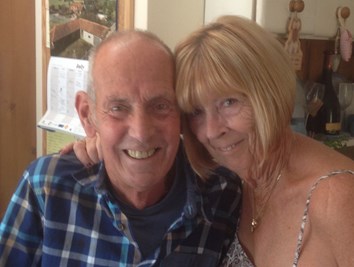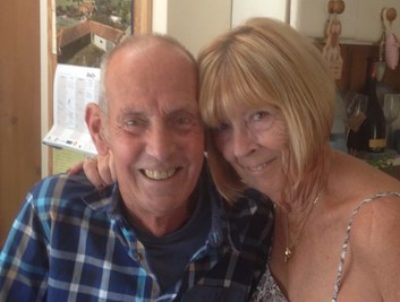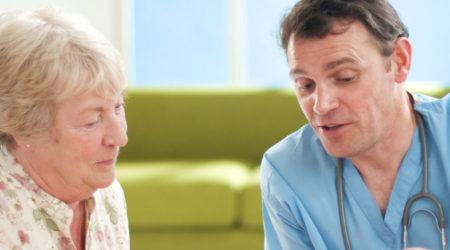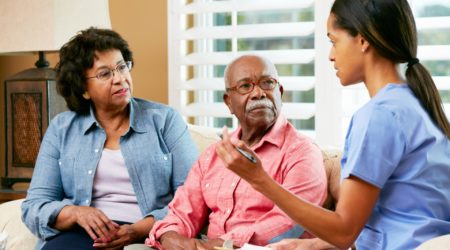



Laraine & John
Laraine shares her experience of caring for her husband John, who was diagnosed with pancreatic cancer in 2014.
My husband John was an extrovert, Peter Pan, full of energy and always pursuing active hobbies. He was devastated when his brother-in-law died with pancreatic cancer early in 2012 – little did he know that he was soon to succumb to the same illness.
John’s symptoms
John was a young 70 years old when, a little later in 2012, he began to suffer constant lower back pain. Never one to complain, he finally went to our GP as it was beginning to impact on his life.
Thus began a year of repeated visits to the GP, where he was prescribed Tramadol (which didn’t help), sent for physio and referred to the Pain Management Clinic at the hospital. He was told by the pain specialist that he should go hiking along our beach! John had always walked regularly with our dog, but by this time the pain was debilitating him. He said to me one day, “I just wish I could wake up one morning and feel normal”.
By late 2013 I noticed he was eating less and frequently taking Gaviscon. He had always been slim so I wasn’t aware of any noticeable weight loss. He was also tiring quickly and sleeping most afternoons. I was getting concerned and accompanied him to our GP to share my observations of his health. The following day, in January 2014, he developed jaundice and within days was admitted to hospital. It was at this point that I believe our GP put all the symptoms together and suspected pancreatic cancer – although she didn’t tell him. She told me this once he had been diagnosed, but it took the jaundice and feeling his abdominal area to reach her conclusion.
Managing John’s pain
Following scans John was given the pancreatic cancer diagnosis and the consultant advised he was not a candidate for surgery, that his condition was terminal, and he had a prognosis of 6 months.
Then followed several attempts to insert a stent into his bile duct, initially via his oesophagus, with no success. A drainage bag for his bile was attached through his abdomen and finally a stent was inserted by the same route. In all he spent a month in hospital and, whilst the jaundice was dealt with, he was a very sick man.
I brought him home with a pharmacy’s worth of medications, which required making a chart to ensure they were administered correctly. They included fentanyl patches, oromorph, creon tablets and many others. A couple of months later John was admitted for a week to a local hospice to sort out his pain management, but despite being offered the opportunity to return nearer the end, we were adamant he should stay at home.
Our bungalow in North Norfolk had beautiful gardens and he could enjoy resting in the conservatory watching the birds and squirrels. He received a full blood transfusion and a course of steroids, which revived his energy levels for a few weeks, and also a week of radiotherapy in May to relieve the pain.
Celebrating our wedding anniversary
In June 2014 we celebrated our golden wedding anniversary with a wonderful party for friends and relatives in a luxury lodge on the water’s edge of the Norfolk Broads (near our home). Our family stayed all week and the actual party day was bittersweet – we had our last ever dance to our favourite song, gold balloons floated in the air and the outpouring of love and support from everyone was incredible.
John was able to sit by the river and fish with our daughter – although she caught more than him!
Caring for John at home
After that, John deteriorated quickly. He had a catheter fitted and his legs and feet became swollen, along with constant itching. He became unable to control his bowels and slept most of the time, eating very little.
We were provided with a hospital bed and air mattress, a commode and other equipment. In his last month he had a morphine driver, with nurses coming daily to top this up and to help me with showering and eventually bed baths. Marie Curie nurses became great friends to us both, allowing me to have some nights of uninterrupted sleep.
The final week of John’s life was so difficult. He fell into a semi-coma on the Saturday and experienced terminal agitation for 48 hours. This was incredibly distressing to watch and I take comfort from knowing that he wasn’t really aware of what was happening. Our wonderful NHS nurses came out at all hours of the night to increase his morphine.
The last few days
During his last few days, when he had lapsed completely into coma, my daughter and I made a ‘bed nest’ around him. We pushed another bed alongside, where one of us was always with him, played his favourite Bocelli music and burned joss sticks. The atmosphere was so peaceful and calm. Even Molly, his beloved springer spaniel, joined us on the bed.
Finally, at 0.55 on Friday 15th August 2014, John slipped away with me laying beside him, telling him it was alright to go now.
I want to express my gratitude to the NHS nursing team and Marie Curie nurses, without whom it might not have been possible for John to stay at home. Caring for him was exhausting and heartbreaking. I have MS but I somehow found the strength to do it and I will never regret one moment of those last months we were able to be together.
“If only” is so easy to say – if only someone had recognised his symptoms sooner then I might still have John here with me now. I just pray that earlier diagnosis will become the norm; that GP’s will be alert to the symptoms and that maybe a specific test can be developed to ascertain a diagnosis of pancreatic cancer.
June 2019




